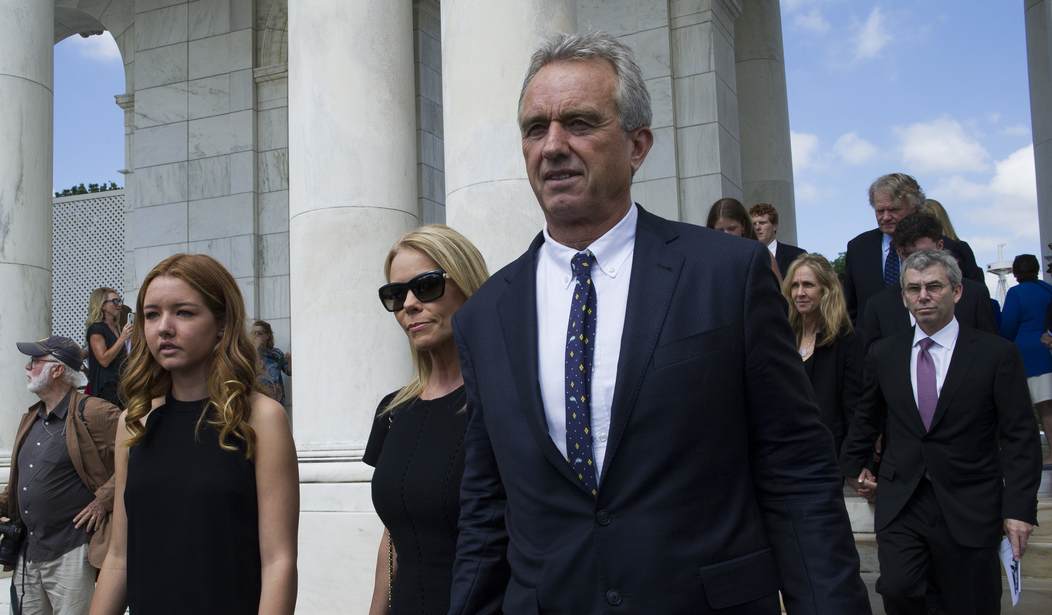“Not pleased” is being diplomatic.
They are vicious and likely to get more vicious if polling in a week or two shows that the endorsement has made a dent in the margins in crucial swing states, which I predict it will.
Related: Unhinged Liberals Accuse RFK Jr. of Using Secret Nazi Code on Twitter
Consider the dripping disdain — the overstrained prose — from the overeducated elitists at The Nation (emphasis added):
When Robert F. Kennedy Jr. announced his quixotic presidential run, he tried to present himself as a classic reformer working to effect change from outside America’s rigid two-party duopoly. At the same time, of course, he was using his dynastic family name—a prime legacy of that duopoly—to drive attention toward his candidacy, and the pet issues, such as vaccine denialism and free-range conspiracy theorizing, that came in its wake. Indeed, he told podcaster Joe Rogan last year that the CIA could well be plotting to take his life, just as he believes the agency conspired in the assassination of his uncle, John F. Kennedy.
This unseemly impulse to thrust both himself and his storied family name into the dark machinations of deep-state intrigue, via a platform furnished by one of the mediasphere’s most powerful right-wing influencers, sums up the heart of RFK Jr.’s crusade. His third-party campaign offered followers the vicarious thrill of imagining that they, too, were granted a pivotal role in the drama of history, by powering out of the orbit of the corrupt, bought-out status quo. Their candidate’s success would expose the hollow charades of elite power-sharing once and for all, and redeem the long-suppressed promise of virtuous and honest self-governance.
Now that Kennedy has announced that he’s forsaking the campaign, and endorsing Donald Trump, it’s all too obvious that the hollow charade had set up shop from inside the house. In his official press conference in Phoenix announcing his withdrawal, Kennedy reprised Ronald Reagan’s old stump refrain: that he hadn’t left the Democratic Party; the party had left him. Inevitably, Kennedy’s narrative of the concerted campaign to marginalize him “engineered by DNC operatives” came off more as a more personal and petty complaint than Reagan’s did. It was the lament of an aristocratic heir excised from the family will. Kennedy spun out an account of persecution in which these cunning apparatchiks “deployed DNC-aligned judges to throw me and other candidates off the ballot and to throw President Trump in jail.” Thanks to this Democratic Party animus, Kennedy explained that he wasn’t suspending his entire campaign—just his efforts in swing states that might enhance Harris’s campaign at Trump’s expense…
But the sorry saga of Kennedy’s run reveals more than standard-issue hucksterism. The essence of his appeal stems from a syndrome in American public life that might be called mogul brain—the notion that heroic business leaders possess a unique capacity to heal the nation’s ills.
These people love dismissing any outsider’s attempt to reimagine American politics as “quixotic,” In so doing, they inadvertently, perhaps, give their game away, which is rigging the political system to prevent any kind of much-needed systemic reform — a #DraintheSwamp regime, if you will.
Matt Margolis covered what Kennedy’s own democrat family members have been saying about him publicly — and it’s brutal betrayal of familial loyalty, in my opinion, calling his endorsement a “sad end to a sad story.”
Network news is similarly apoplectic.
Watch the senior editor at The Atlantic (deep state Pravda) Ron Brownstein smearing RFK Jr. for his questioning of vaccine safety and calling conjecture over his potential role in shifting electoral support to Trump a “lunatic conversation.”
So-called “republican strategist” Stuart Stevens calls RFK Jr. “sad” and accuses him of “supporting Putin,” further deriding him as “pro-polio.”
This is sick stuff, and we can expect a hell of a lot more of it.









